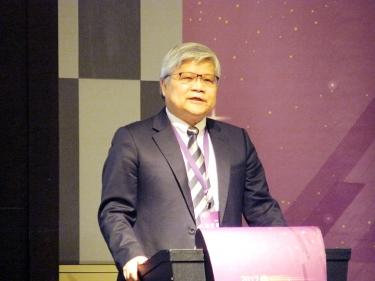Taiwan’s semiconductor industry is bracing for escalating global competition amid rising protectionism and the ascension of China, Taiwan Semiconductor Industry Association (TSIA, 台灣半導體協會) director-general C.C. Wei (魏哲家) said yesterday.
Wei made the remarks during his opening speech at the annual TSIA meeting in Hsinchu.
Wei also serves as cochief executive officer of Taiwan Semiconductor Manufacturing Co (TSMC, 台積電) and is to become the sole chief executive of the chip supplier to Apple Inc in June next year in the company’s latest succession plan.
TSIA members are being presented with enormous business opportunities primarily from the nascent adoption of artificial intelligence, which is expected to be widely applied to virtual reality and augmented reality devices, the Internet of Things and self-driving cars, Wei said.
At the same time, local semiconductor companies are facing challenges, he said.
“It is a challenge for Taiwan’s semiconductor industry [to fend off competition from China] as the Chinese government is endeavoring to foster its semiconductor industry,” Wei said. “It is undeniable that China has risen to be the world’s biggest semiconductor market, with more than a 30 percent share.”
Chinese central and local governments fully support its semiconductor companies to enhance their competitiveness and reduce the nation’s dependence on chip imports. China has an ultimate goal of bringing the nation to the center of the worldwide semiconductor industry by 2025.
To address the issue, Taiwanese semiconductor companies should carve out their own technological capabilities, Wei said.
China said it would boost homemade chip supply in the nation to 40 percent by 2020 and to 60 percent by 2025, which is placing greater pressure on the nation’s export-oriented semiconductor firms, chip tester and packager Powertech Technology Inc (力成科技) general manager Hung Chia-yu said.
“Taiwanese chip testers and packagers should consolidate and work together to combat growing competition from Chinese rivals,” Hung said.
Powertech’s combination with Greatek Electronics Inc (超豐電子) has set an example, he added.
Local companies should focus on differentiating themselves from their Chinese peers in terms of their products and technology, he said.
It is also important to better manage customer relations and cultivate talent, he said.
TSIA would continue to act as a bridge between the local semiconductor industry and government agencies to help the government implement practical and beneficial policies for the industry, Wei said.
Stable supply of land, water, electricity and talent are top




